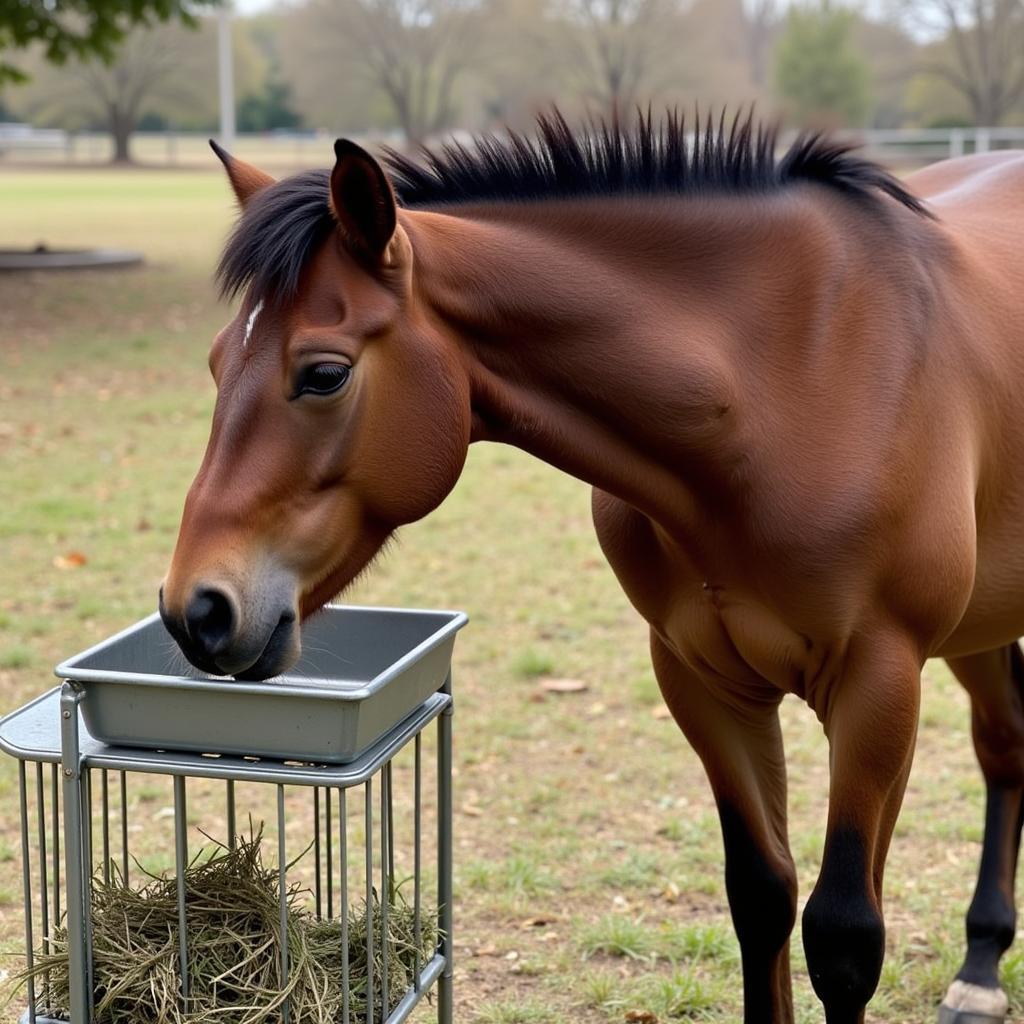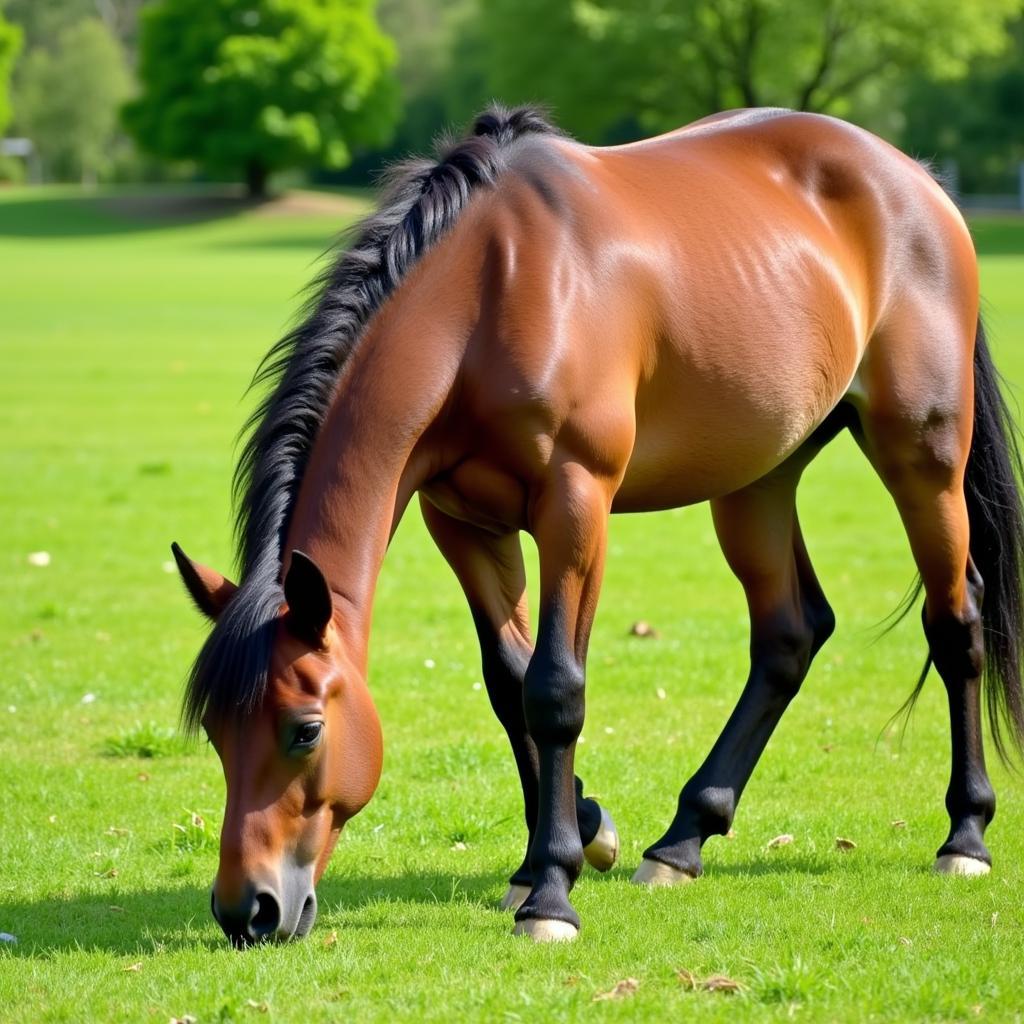Miniature horses, with their undeniable charm and manageable size, are becoming increasingly popular as pets. However, their small stature doesn’t translate to a simplified diet. Understanding the nuances of Mini Horse Feed is crucial for their health and well-being. Providing the correct nutrition is essential for maintaining their ideal weight, supporting their energetic personalities, and preventing a range of health issues.
Choosing the Right Mini Horse Feed
Selecting the appropriate mini horse feed can be a daunting task. Unlike full-sized horses, minis have a unique digestive system and specific nutritional requirements. Overfeeding can lead to obesity, laminitis, and other serious health problems, while underfeeding can result in malnutrition and a weakened immune system. So, how do you navigate the world of mini horse feed?
One of the first things to consider is the age of your mini. Young, growing minis require a feed formulated for growth, with higher levels of protein and essential nutrients. Adult minis, on the other hand, need a maintenance feed designed to support their everyday activities. Senior minis often benefit from a senior feed that addresses the specific needs of aging horses.
The activity level of your mini also plays a significant role in determining the appropriate feed. A mini used for driving or other strenuous activities will require more calories and nutrients than a mini kept solely as a companion. Always consult with a veterinarian or equine nutritionist to create a personalized feeding plan that meets your mini’s individual needs.
After this introduction, let’s delve deeper into the various aspects of feeding your miniature horse. You might also consider a specialized mini horse feeder to control portion sizes and prevent waste.
 Miniature horse enjoying its feed from a specialized feeder.
Miniature horse enjoying its feed from a specialized feeder.
Understanding the Nutritional Needs of Mini Horses
Mini horses require a balanced diet consisting of forage, concentrates, and supplements. Forage, such as hay or pasture, should form the foundation of their diet, providing essential fiber for digestive health. Concentrates, like grain or pellets, offer additional calories and nutrients, especially for minis with higher energy requirements. Supplements can be added to address specific deficiencies or support overall health.
The quality of hay is crucial. Look for hay that is free of mold, dust, and weeds. Timothy hay is a popular choice, but other grass hays like orchard grass or brome can also be suitable. Avoid alfalfa hay for most minis, as it is high in calcium and can contribute to urinary calculi.
When selecting concentrates, choose a purina miniature horse feed specifically formulated for miniature horses. Avoid feeding cattle or other livestock feeds, as they may contain ingredients that are harmful to horses. Always read the feed label carefully and follow the manufacturer’s recommendations for feeding amounts.
“Proper nutrition is the cornerstone of a mini horse’s well-being,” says Dr. Emily Carter, DVM, specializing in equine medicine. “A balanced diet not only fuels their energy but also supports their immune system, promotes healthy hoof growth, and contributes to their overall longevity.”
Common Mini Horse Feeding Mistakes
Overfeeding is perhaps the most common mistake mini horse owners make. Their small size can be deceiving, leading owners to overestimate their calorie needs. Overfeeding can quickly lead to obesity, which puts significant stress on their joints and increases their risk of developing laminitis, a painful and potentially debilitating hoof condition.
Underfeeding, while less common, can also be detrimental. Underfed minis may lack the energy and nutrients they need to thrive. They may become lethargic, lose muscle mass, and have a weakened immune system. This can make them more susceptible to illness and injury.
Another common mistake is feeding infrequent, large meals. Mini horses have small stomachs and are designed to graze throughout the day. Feeding small, frequent meals mimics their natural grazing behavior and helps prevent digestive upset. Consider providing outdoor horse stalls ideas with access to pasture or hay at all times.
“Remember, every mini horse is an individual,” adds Dr. Carter. “Factors like age, activity level, and overall health all influence their nutritional needs. Regularly monitoring their weight and body condition is essential to ensure they are receiving the right amount of feed.”
 A healthy miniature horse grazing peacefully in a lush pasture.
A healthy miniature horse grazing peacefully in a lush pasture.
Conclusion
Providing the correct mini horse feed is vital for maintaining their health, happiness, and longevity. By understanding their unique nutritional requirements and avoiding common feeding mistakes, you can ensure your miniature companion thrives. Remember to choose a high-quality feed formulated for minis, provide plenty of forage, and monitor their weight and body condition regularly. For additional resources and horse accessories online, visit our website. Always consult with a veterinarian or equine nutritionist to create a personalized feeding plan that meets your mini’s individual needs. Proper mini horse feed is an investment in their long-term well-being.
FAQ
- How much should I feed my mini horse?
- What type of hay is best for mini horses?
- Can I feed my mini horse treats?
- What are the signs of a mini horse being overweight or underweight?
- How often should I deworm my mini horse?
- What are the signs of laminitis in mini horses?
- How can I ensure my mini horse is getting enough water?
Scenarios
- Scenario: Your mini horse is losing weight despite eating a seemingly adequate amount of food.
- Possible Causes: Dental issues, parasites, underlying health conditions.
- Solution: Consult a veterinarian for a thorough examination and diagnosis.
- Scenario: Your mini horse is constantly hungry and begging for food.
- Possible Causes: Boredom, insufficient forage, inadequate calorie intake.
- Solution: Increase forage availability, provide enrichment activities, and consult a nutritionist to evaluate the current diet.
- Scenario: Your mini horse is overweight and developing a cresty neck.
- Possible Causes: Overfeeding, excessive consumption of high-calorie treats, lack of exercise.
- Solution: Reduce calorie intake, restrict treats, and increase exercise.
Further Reading
- Horse dies at kentucky state fair
- More articles on mini horse care and nutrition can be found on our website.
Contact Us
For any assistance, please contact us: Phone: 0772127271, Email: [email protected] or visit us at QGM2+WX2, Vị Trung, Vị Thuỷ, Hậu Giang, Việt Nam. We have a 24/7 customer service team.